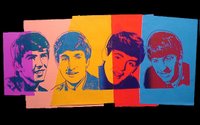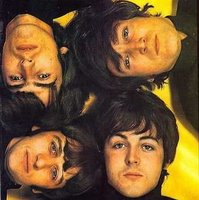As I’ve said earlier, only those people quite familiar with the Beatles’ catalogue of songs will flip out over what George and son Giles Martin have achieved with their labor of Love. A reviewer likened it to bumping on a neighbor while on vacation in some far away foreign place—the clash of the familiar and the strange conjures forth a feeling of happy discovery.
Listening to the new album in full 5.1 channel glory, however, is an altogether mind-blowing experience. I thought I could do other stuff while listening to the album. But after plopping myself on the sofa in the middle of the room, literally being surrounded by Love, I couldn’t get up anymore. I was transfixed, transported. My god, so this is what it feels like to be on drugs!
Love is old, love is new
— “Because”
The album opens with the vocal track of “Because” mixed with the sound of birds tweeting from “Across The Universe,” an ethereal intro where everything old is made new, thanks to technology and the technical wizardry of the Martins.
 The magical mystery tour begins in earnest with the rumbling piano ending of “A Day In The Life” played backwards, followed by the opening chord of “A Hard Day’s Night” segueing into the dramatic drum solo of Ringo in “The End”—all that merely as intro to a blistering “Get Back.” That song then flows effortlessly into “Glass Onion” mashed up with snippets from other Beatles songs.
The magical mystery tour begins in earnest with the rumbling piano ending of “A Day In The Life” played backwards, followed by the opening chord of “A Hard Day’s Night” segueing into the dramatic drum solo of Ringo in “The End”—all that merely as intro to a blistering “Get Back.” That song then flows effortlessly into “Glass Onion” mashed up with snippets from other Beatles songs.The reworked “Eleanor Rigby” was made achingly more beautiful by dropping the opening vocals and letting the dramatic strings shine through.
I never heard the song “I Am The Walrus” so powerful and insistent and ominous as now, what with the different elements coming in from all sides.
I thought one of the highlights of the album is the mash-up medley of “Drive My Car/The Word/What You’re Doing.” Here my breath was literally taken away when each song effortlessly morphed into one another. It’s like, of course it’s so simple and obvious why didn’t anybody ever think of combining them before? But this highlight would soon be topped by “Within You Without You/Tomorrow Never Knows” mash-up, where the vocal track of the former is placed on top of the psychedelic music of the latter. George Harrison’s Indian-inspired mantra now sounds like a mystic drug trip.
Another beautiful tweak is the reworking of “Octopus’s Garden.” It opens with Ringo singing over the melancholy orchestral score of “Good Night.” It underlines what went unnoticed before—the inherent sadness in Ringo’s voice. This lends a previously lightweight, fluffy song more poignancy and drama.
Of course not all tracks are that drastically tweaked. A number of classics like “Help!” “Something,” “Revolution” and “A Day In The Life” are left almost untouched. The joy is in listening to them in crystal-clear 5.1, so that while the songs remain familiar, it’s like hearing them for the first time. Some songs merely had their intro or ending tweaked to accommodate the demands of the Cirque du Soleil show.
The beauty of Love’s version of “Strawberry Fields Forever” is in its alternate ending. Whereas the original had a long fade out only to fade in to an extended ending, this version had the ending mashed up with snippets from different Beatles songs. I identified elements from “Sgt. Pepper’s Lonely Hearts Club Band,” “In My Life,” “Penny Lane,” “Piggies” and “Hello Goodbye” seamlessly segueing one after the other, as if time broke down and songs from different years all became one; Strawberry Fields really sounded forever.
The only music ever recorded for this album was an orchestral score for an alternate take of “While My Guitar Gently Weeps.” The naked, acoustic-type rendition can be heard in The Beatles’ Anthology Vol. 3. For Love George Martin was asked to clothe the song with an orchestral background like what he did for the classic “Yesterday.” Today George Harrison has a song that’s a mirror image of Paul McCartney’s most popular tune.
 By this time, towards the end the album, the mood turns more sober, despite “A Day In The Life’s” jaunty mid-song shift, “Hey Jude’s” still-hopeful lyrics and the up-tempo reprise of “Sgt. Pepper’s Lonely Hearts Club Band.” Maybe it was in anticipation of the end to the marvelous magical musical mystery tour that the Beatles have brought us. It was more than 40 years ago today that Sgt. Peppers taught the band to play, and play they did. Even now in 2006 the four wonderful lads from Liverpool continue to “make” music that surprises and delights. Sure, other artists have broken their chart records and have pushed the envelope even further. But hearing their raw tracks reworked into something new, you can really tell that The Beatles were one of the important pioneers who broke new ground and unshackled pop music from its previous moorings. They were at the forefront of a new frontier and you can clearly hear them treading new territories. With Love they break new ground again—a legitimate mash-up album.
By this time, towards the end the album, the mood turns more sober, despite “A Day In The Life’s” jaunty mid-song shift, “Hey Jude’s” still-hopeful lyrics and the up-tempo reprise of “Sgt. Pepper’s Lonely Hearts Club Band.” Maybe it was in anticipation of the end to the marvelous magical musical mystery tour that the Beatles have brought us. It was more than 40 years ago today that Sgt. Peppers taught the band to play, and play they did. Even now in 2006 the four wonderful lads from Liverpool continue to “make” music that surprises and delights. Sure, other artists have broken their chart records and have pushed the envelope even further. But hearing their raw tracks reworked into something new, you can really tell that The Beatles were one of the important pioneers who broke new ground and unshackled pop music from its previous moorings. They were at the forefront of a new frontier and you can clearly hear them treading new territories. With Love they break new ground again—a legitimate mash-up album. The album ends fittingly with “All You Need Is Love”:
There’s nothing you can do that can’t be done.
Nothing you can sing that can’t be sung…
There’s nothing you can make that can’t be made.
No one you can save that can’t be saved.
Nothing you can do but you can learn how to be in time
It’s easy.
After hearing Love on 5.1, I may have a hard time going back to its stereo counterpart. Worse, I may find the original songs now lacking in crisp sound and brilliance (an unfortunate by-product of digital re-mastering). But I guess there’s no turning back. In the ending of “Come Together/Dear Prudence/Cry Baby Cry” Paul sings, “Can you take me back where I came from? Can you take me back?” and I realized the answer is no. How can I, when there’s more to love with Love?
And in the end the love you take
is equal to the love you make.
— “The End”

No comments:
Post a Comment